Trump’s doctors paint a rosy — but vague — picture of his health during Covid-19 treatment
President Donald Trump’s physicians on Saturday painted a rosy, but vague, picture of his health as he underwent treatment for coronavirus, saying he was doing well even as they declined to say how high his fever went and whether he ever needed supplemental oxygen.Trump is getting a five-day course of the experimental antiviral drug remdesivir and got a large dose of an experimental monoclonal antibody treatment meant to rev up his immune response, his doctors said.
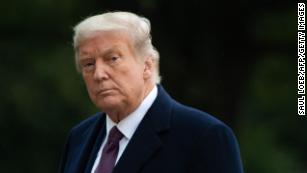
President Donald Trump has Covid-19. How serious is his risk?Trump announced early Friday morning he had tested positive for coronavirus and was taken to Walter Reed National Military Medical Center on Friday afternoon. Sources told CNN Trump had been worryingly ill, with a fever and trouble breathing.But on Saturday, his doctors said he was doing fine and dodged questions about how sick he had been.”This morning, the president is doing very well,” White House physician Dr. Sean Conley told reporters in a news briefing.”The first week of Covid, and in particular the days seven to 10 are the most critical in determining the likely course of this illness. At this time the team and I are extremely happy with the progress the President has made,” Conley said. “Thursday he had a mild cough and some nasal congestion, fatigue, all of which are resolving and improving.”A source who was present at Walter Reed for the update on President Trump’s condition offered a more blunt assessment.
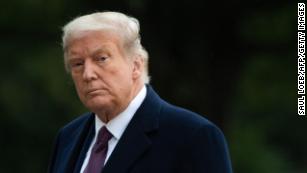
Here’s how a 74-year-old might be treated for Covid-19“The President’s vitals over last 24 hours were very concerning and the next 48 hours will be critical in terms of his care. We are still not on a clear path to a full recovery,” the source familiar with the President’s health told the White House pool reporters after the briefing.A source close to the White House told CNN that Trump had been given supplemental oxygen on Friday. Trump “definitely has had oxygen,” the source said. That would indicate some sort of lung malfunction.However, on Saturday, Conley would not answer direct questions about whether Trump had ever been given oxygen.”Right now he is not on oxygen. Yesterday and today he was not on oxygen,” Conley said, adding, “We discussed it. He asked about it. He is not on it now.”
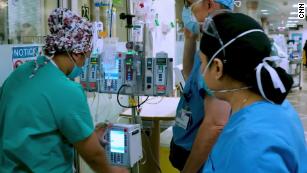
What we’ve learned about Covid-19 seven months after the first US caseConley also would not answer a direct question about whether Trump had any sign of lung damage, saying only that the team had been checking for it. “I am not going to get into the specifics of what the findings of that have been,” he said.Conley said Trump had a blood saturation level of 96, which indicates he is getting enough oxygen. He denied Trump ever had trouble breathing. Trump had a “little cough,” Conley said, and “more than anything, he’s felt run down.”Trump had a fever “Thursday into Friday,” Conley said, but added Trump has not had a fever since Friday. Conley did not say whether Trump had been given fever-reducing medication such as ibuprofen or acetaminophen.Conley said he didn’t want to put a hard date on when Trump could be discharged from Walter Reed, not knowing where Trump is in the course of his illness.”Every day we’re evaluating, does he need to be here, what does he need and where is he going,” Conley said.
Trump’s treatment
Trump got one dose of Regeneron’s monoclonal antibody cocktail — a combination of two lab-engineered proteins designed to home in on the coronavirus. He also had received the first infusion of a five-day course of remdesivir, Gilead Science’s experimental antiviral drug.
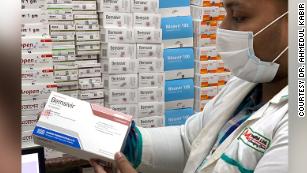
Covid-19 drug rationed in the US is plentiful in developing countriesConley indicated the Walter Reed team was giving Trump a variety of therapies — an approach many doctors are taking in treating coronavirus patients, who suffer a wide range of symptoms.”Remdesivir works a little bit differently than the antibodies. We are maximizing all aspects of his care. Attacking this virus in a multipronged approach,” Conley said.”If there was any possibility that it would add value to his care and expedite his care, I wanted to take it.”It’s not surprising, said Dr. Seema Yasmin, director of research and education at Stanford University’s Health Communication Initiative.”This is the President of the United States — he is going to have the kitchen sink thrown at him,” Yasmin told CNN.Conley said the medical team caring for Trump is watching for blood clots, pneumonia, bacterial infections and other potential complications of coronavirus infection.”We know that all of them are risks associated with his condition. He is receiving all of the standard of care and beyond for routine international Covid protocols,” Conley said.
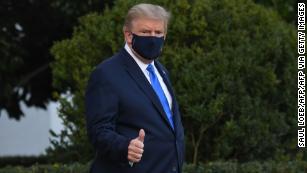
Trump ‘in a race’ against Covid-19 and experimental treatment makes it ‘a fair fight,’ Regeneron CEO says“We are monitoring him very closely for any evidence of complications from either the coronavirus illness or the therapies that we are prescribing to make him better. We have monitored his cardiac function, his kidney function, his liver function — all of those are normal,” Dr. Sean Dooley, one of the team of physicians taking care of Trump, told reporters.Conley said it is not clear how long Trump would stay at Walter Reed, located just outside Washington in Bethesda, Maryland.”Every day, we’re reviewing with the team his needs for being here,” Conley said. “And as soon as he gets to the point where it’s not a requirement, he may still need some care, but if we can provide that downtown at the house, then we will transition at that point, as long as it’s safe and appropriate and the team agrees.”But the team of doctors arrayed before reporters on Saturday took pains to indicate the President was doing well.Get CNN Health’s weekly newsletter
Sign up here to get The Results Are In with Dr. Sanjay Gupta every Tuesday from the CNN Health team.”He’s in exceptionally good spirits and in fact, as we were completing our multidisciplinary rounds this morning, the quote he left us with was ‘I feel like I could walk out of here today,’ and that was a very encouraging comment from the president,” Dooley said.As for first lady Melania Trump, Conley said she was doing well and recovering from coronavirus.”First lady’s doing great, thanks for asking,” Conley said. “She has no indication for hospitalization advanced therapy. She’s convalescing at home.”
